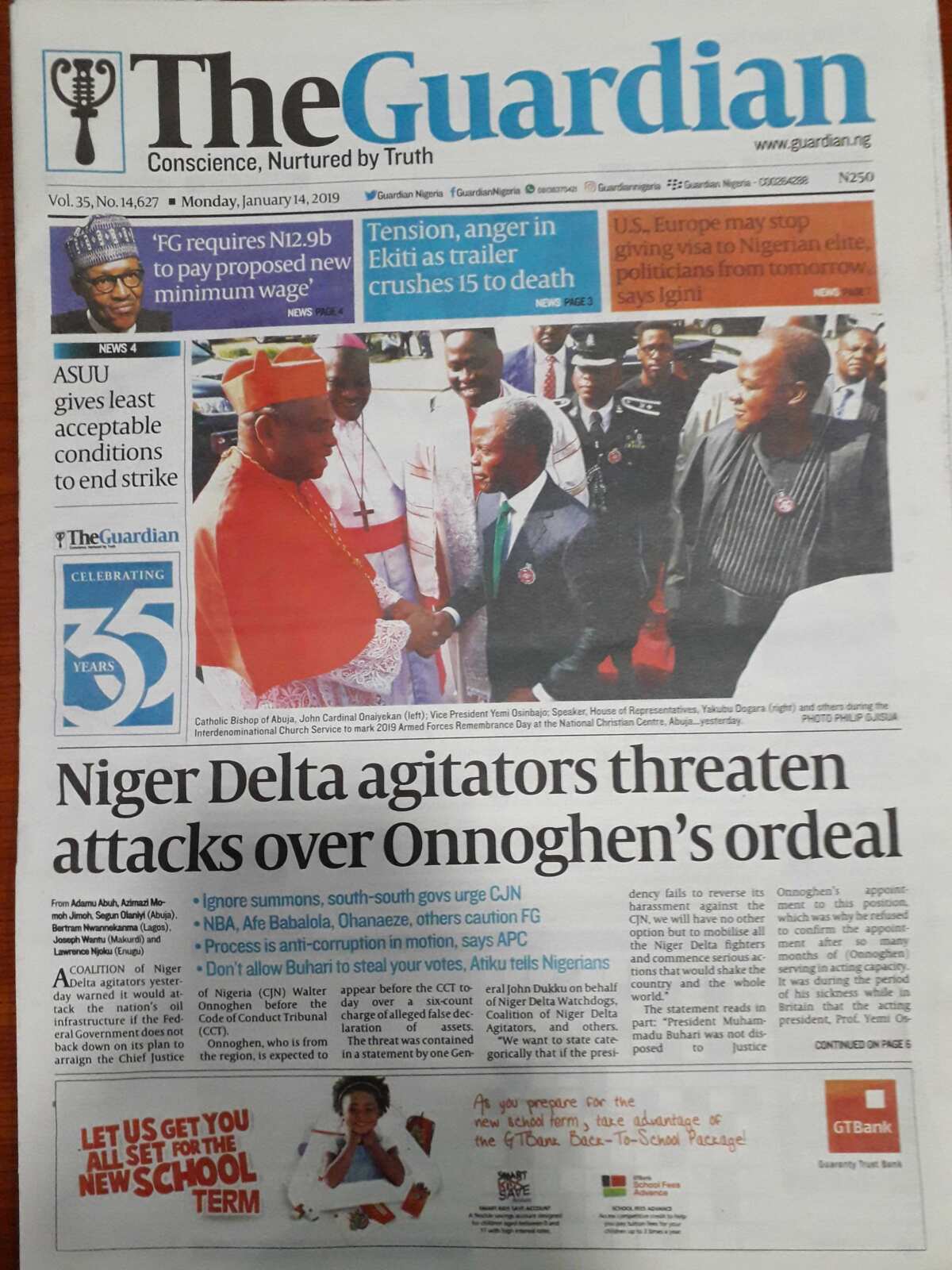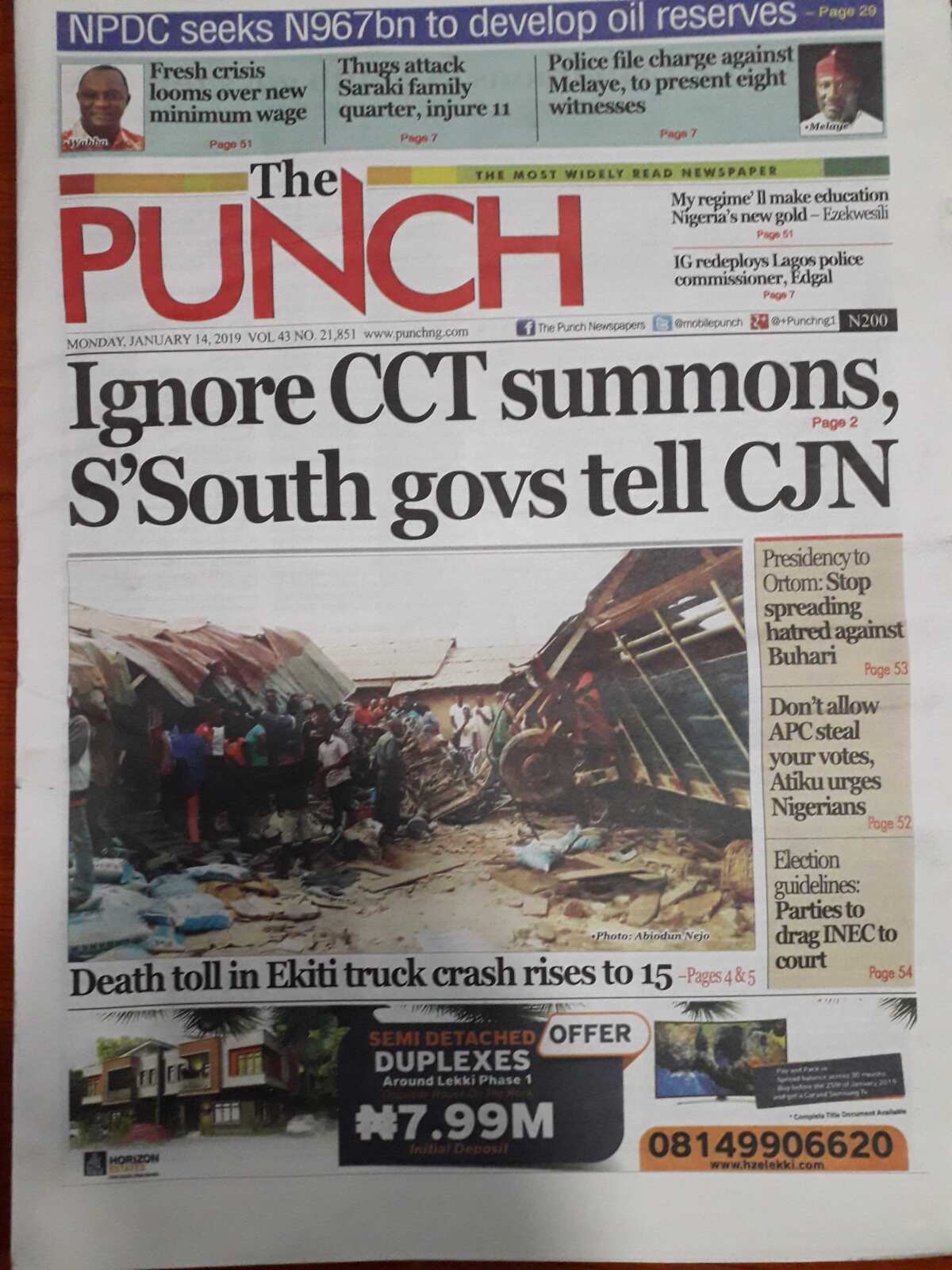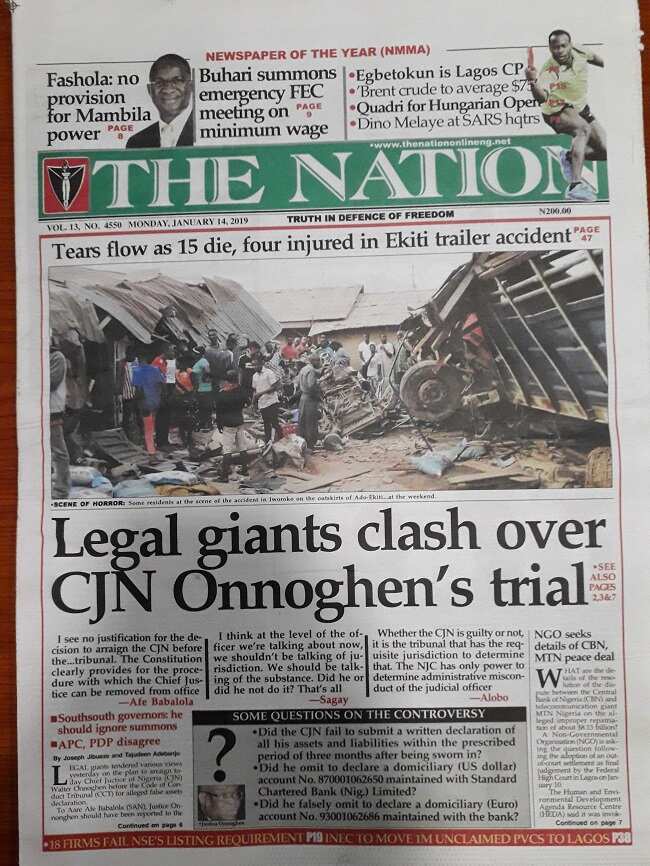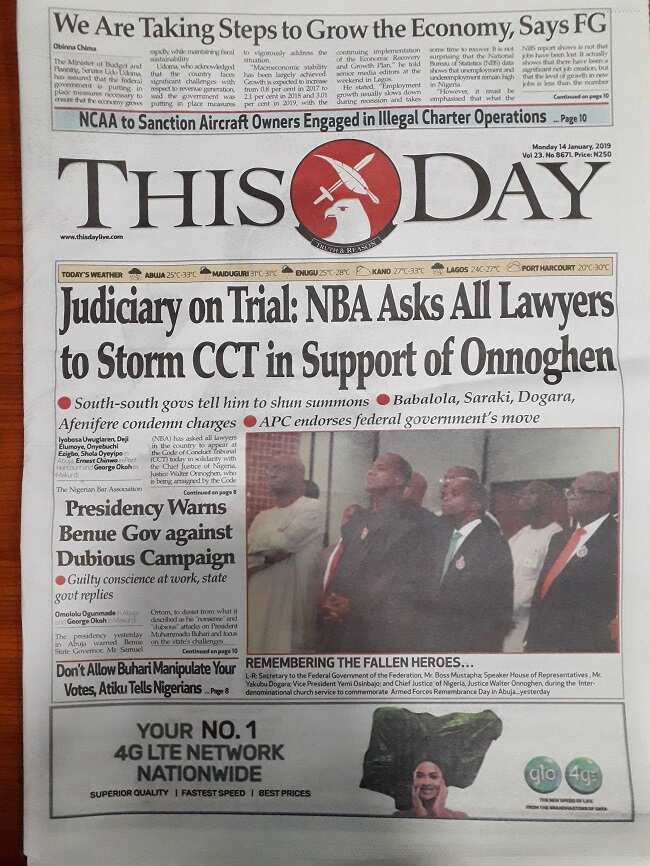The newspaper review for Monday, January 14, focuses on the controversies generated from the plan to arraign the Chief Justice of Nigeria (CJN), Walter Onnoghen, before the Code of Conduct Tribunal (CCT) for alleged false assets declaration.
The plan to arraign the Chief Justice of Nigeria (CJN) Walter Onnoghen before the Code of Conduct Tribunal (CCT) for alleged false assets declaration has caused tension in Niger Delta as a Coalition of Niger Delta agitators on Sunday, January 13, threatened to attack the nation’s oil infrastructure over the case.
The Guardian reports that threat was contained in a statement by one General John Dukku on behalf of Niger Delta Watchdogs, Coalition of Niger Delta Agitators, and others.

The Guardian newspaper for Monday, January 14, credits: Snapshot from Legit.ng
Source: UGC
READ ALSO: 11 injured as thugs reportedly attack Saraki family residence
“We want to state categorically that if the presidency fails to reverse its harassment against the CJN, we will have no other option but to mobilise all the Niger Delta fighters and commence serious actions that would shake the country and the whole world.”
“President Muhammadu Buhari was not disposed to Justice Onnoghen’s appointment to this position, which was why he refused to confirm the appointment after so many months of (Onnoghen) serving in acting capacity. It was during the period of his sickness while in Britain that the acting president, Prof. Yemi Osinbajo, confirmed the appointment.
“We wish to also recall that in August last year, Mr. Matthew Seiyefa of Bayelsa State, who was the most senior and most qualified officer at the time, was appointed to the position of acting director general of the Department of State Services by Prof. Osinbajo, only to be replaced with a retired and junior officer to Mr. Seiyefa, Mr. Yusuf Magaji Bichi by President Buhari as soon as he (Buhari) resumed duties. We hereby vehemently resist any attempt to remove CJN Walter Onnoghen from office.
Meanwhile, the Chief Justice of Nigeria (CTN) Justice Walter Onnoghen, has been urged by governors of the south-south geopolitical zone to ignore the summons issued to him by the Code of Conduct Tribunal to come and defend the false assets declaration charges levelled against him.
The Punch reports that the governors after the emergency meeting held at the Bayelsa state governor’s Lodge, Abuja, said the CJN should shun the summons.

The Punch newspaper for Monday, January 14, credits: Snapshot from Legit.ng
Source: UGC
The newspaper states that present at the meeting included the Governor of Bayelsa State, Seriake Dickson; Nyesom Wike, (Rivers State); Ben Ayade, (Cross River); and Udom Emmanuel, (Akwa Ibom). Delta and Edo states’ governors were absent at the meeting.
The governors in a communique, read by Governor Dickson said while they were not opposed to a genuine fight against corruption, such an action must always be anchored on the rule of law.
In a related report, some senior lawyers in the country have expressed different views on the plan to arraign today Chief Juctice of Nigeria (CJN) Walter Onnoghen before the Code of Conduct Tribunal (CCT) for alleged false assets declaration
The Nation reports that a senior lawyer, Afe Babalola, faulted the CJN Onnoghen’s arraignment on the ground that the judge should have been reported to the National Judicial Council (NJC) instead of being taken before the CCT.

The Nation newspaper for Monday, January 14, credits: Snapshot from Legit.ng
Source: UGC
Afe Babalola, based his argument on the Court of Appeal judgment that it would amount to the usurpation of NJC’s powers if any judicial officer commits a professional misconduct within the scope of his duty and is investigated, arrested and subsequently prosecuted without a formal complaint/ report to the NJC.
But another senior lawyer, Itse Sagay, who serves as the chairman of the presidential Advisory Committee Against Corruption described it as unconstitutional and a bid by the justices to get immunity through the back door.
READ ALSO: NAIJ.com upgrades to Legit.ng: a letter from our Editor-in-Chief Bayo Olupohunda
He said: “I want to make a few points. The first is that the Nganjiwa case, as far as I’m concerned, is unconstitutional. That judgment was unconstitutional. It’s an illegal judgment.
“It is an illicit attempt by some Justices of the Court of Appeal to give themselves immunity contrary to the provisions of the Constitution.
“The Constitution has named those entitled to immunity – the President, Vice President, governors and deputy governors.
Meanwhile, President Muhammadu Buhari’s administration has been accused by the Nigerian Bar Association (NBA) of deliberately intimidating judges in a bid to emasculate the judiciary before the 2019 general elections.
This Day reports that the NBA in a statement signed by its national president, Paul Usoro, accused the federal government assaulting on both the Judiciary and the Legislature by its agencies.

This Day newspaper for Monday, January 14, credits: Snapshot from Legit.ng
Source: UGC
NAIJ.com (naija.ng) -> Legit.ng We have updated to serve you better.
Nigeria Latest News: Buhari vs Atiku - 2019 Elections | Legit TV
Source: Legit.ng
from Nigeria News today & Breaking Naija news ▷ Read on LEGIT.NG 24/7 http://bit.ly/2FwKOXt
via EDUPEDIA24/7
Comments
Post a Comment